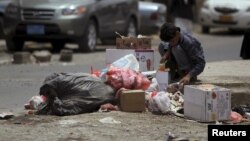Yemen's residents said the war tearing their country apart is misunderstood and mismanaged, and they hold foreign intervention responsible for what has become a humanitarian disaster.
Some Yemenis hold out hope the Saudi-led coalition airstrikes will help the government of President Abd-Rabbu Mansour Hadi return to power. But many say the only foreign help they want is in getting the warring parties to return to the negotiating table.
The conflict pits the Houthis, backed by Iran and former Yemeni president Ali Abdullah Saleh, against the internationally recognized government of Hadi, backed by Saudi Arabia and its coalition.
But Summer Nasser, an activist and journalist who recently left Aden, said after Hadi fled the city, much of the regular army stopped fighting in Aden, leaving residents to fight the Houthis.
'Bloodshed on the way'
"You have people naturally defending their homes, their families. So you have a lot of bloodshed on the way, unfortunately," Nasser said.
She said Saudi-led airstrikes technically support the anti-Houthi fighters — whoever they are — but Yemeni people complain they kill indiscriminately. She also said the Saudi blockades are keeping out food imports, supplies and humanitarian aid, while trapping people amid the fighting.
Even the Houthi militia in the southern port city of Aden is not really made up of people who self-identify as Houthis from their homeland in Yemen’s far north, but of soldiers loyal to ousted president Saleh.
But among the northerners who have traveled to Aden to fight, Nasser said are children.
“They are carrying AK-47s. They are literally ... dragging them. That is how small they are, these children," she said.
The World Health Organization reported that at least 540 people have been killed and 1,700 wounded, many of them civilians, since the rebels and their allies launched an intensified battle on March 19. The dead include at least 74 children killed since the start of the airstrikes, the U.N. said, and at least 44 children have been wounded.
The United States has promised to increase military aid to Saudi Arabia as aid workers struggle to import medical supplies into Yemen, a dynamic that hits Yemenis hard.
Seek negotiations
In the capital, Sana'a, where the Houthis are basically in charge, some residents said they did not want the Houthis to take over, but they also said the airstrikes are further punishing the people, not helping them.
At his grocery store on a busy thoroughfare in Sana'a, Ahmed al-Awlaki said airstrikes can only grow Houthi influence in Yemen as people are increasingly angry at Saudi Arabia. Like many Yemenis, he believes negotiations are the answer, despite several rounds of failed peace talks.
At a nearby drugstore tucked behind Sana'a’s main hospital, pharmacist Ali Abdallah Jahlan agreed.
Jahlan said if foreign powers are not working toward peace talks, they should get out altogether.
Others in town are more hopeful about the current situation, despite the growing danger and fear. Ibrahim, a youth activist, said airstrikes may force militants to return to their “dens” in the north.
But while Ibrahim is staunchly anti-Houthi, he does not want all the Houthis killed - just pushed out of the capital.
Houthis were once known as a “movement” in Yemen, rather than as militants, and their beliefs are rooted in an offshoot of Shi'ite Islam, a large minority in Yemen





